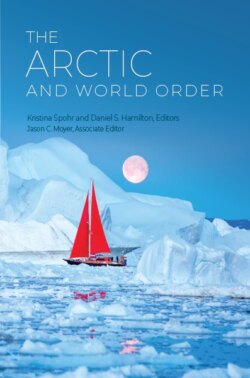Читать книгу The Arctic and World Order - Группа авторов - Страница 11
На сайте Литреса книга снята с продажи.
Shelf Claims and Control of Waterways
ОглавлениеIn 2008, the U.S. Geological Survey estimated that the Arctic holds 13 percent of the world’s undiscovered oil, and 30 percent of its natural gas. Over 70 percent “of the mean undiscovered oil resources is estimated to occur in five provinces: Arctic Alaska, Amerasia Basin, East Greenland Rift Basins, East Barents Basins, and West Greenland-East Canada.” Similarly, over 70 percent “of the undiscovered natural gas is estimated to occur in three provinces: the West Siberian Basin, the East Barents Basins, and Arctic Alaska.” The value of these resources is worth about $18 trillion in today’s prices, roughly equivalent to the entire U.S. economy in 2017.40
The analysis of petroleum resources was widely misinterpreted to reflect offshore reserves, as Arild Moe points out in his chapter in this volume. But as it created the perception of a huge untapped potential that was becoming more accessible because of the ice melt, competition soon began to heat up—less so over what are extremely difficult and costly Arctic offshore oil-related investments and projects than over questions of territory and ownership.41 Russia, Canada, Norway and Greenland have all set their sights on the Lomonosov Ridge—an underwater mountain chain that stretches for 1,240 miles almost directly across the center of the Arctic Ocean and through the North Pole. Under and around this formation lies nearly a quarter of the Earth’s remaining fossil fuel resources.
Russia was first to enter the race, with its bold initial claim in 2001 on the North Pole and an area amounting to half of the Arctic Ocean, some 1.325 million km2 of international seabed under the icesheet and with them future waters and their fishing stocks. Refined claims to the UNCLOS followed.42
Thanks to Russia, the idea that the melting Central Arctic Ocean and its seabed might be divvied up had been planted in the minds of the Arctic littoral states, and so Denmark (Greenland) and Canada each followed suit. On December 14, 2014, Copenhagen claimed an area of 895,000 km2 extending from Greenland past the North Pole to the limits of the Russian Exclusive Economic Zone. On May 23, 2019, Ottawa filed its submission for 1.2 million km2 of seabed, subsoil and seas stretching through the Canada Basin into the U.S. Alaskan shelf—by relying on the Lomonosov Ridge as an extension of Canada’s Arctic archipelago.43 All these territorial claims remain unresolved.
Equally important, as Suzanne Lalonde, Alexander N. Vylegzhanin and J. Ashley Roach explain in this volume, the legal status of various waterways is also in dispute. Canada considers the Northwest Passage to be part of its internal waters under the UNCLOS. The United States and most maritime nations, however, believe those waters to be an international strait with foreign vessels thus having the right of “transit passage.” In their view, Canada would have the right to enact fishing and environmental regulation, and fiscal and smuggling laws, as well as laws intended for the safety of shipping, but not the right to close the passage.44
Like Canada, Russia considers portions of the Northern Sea Route—the navigational routes running through waters within Russia’s Arctic EEZ east from Novaya Zemlya to the Bering Straits—that is the Kara, Vilkitskiy, and Sannikov Straits, as internal waters. But while Russia argues its position on the basis of historical agreements between Russia and England, Canada underlines the aspect of shared sovereignty, namely that the “Canadian” Northwest Passage is considered also to be part of Inuit Nunangat, indeed, their “Arctic homeland.”45
As all the Arctic players—large and small—and their Indigenous peoples maneuver for position and their exact stake in the region—land, seabed, and waters—equally exogenous powers are pressing onto the scene. Ever since the ascent of Xi Jinping to the Chinese Communist Party leadership in 2013, China wants to have a say in the region. So do Japan, South Korea and Singapore in the Far East46 as well as Britain and Germany in Europe.47 All are crowding in as they look north. No one wants to miss out, whatever the issue—be it science, resources, shipping or security.
